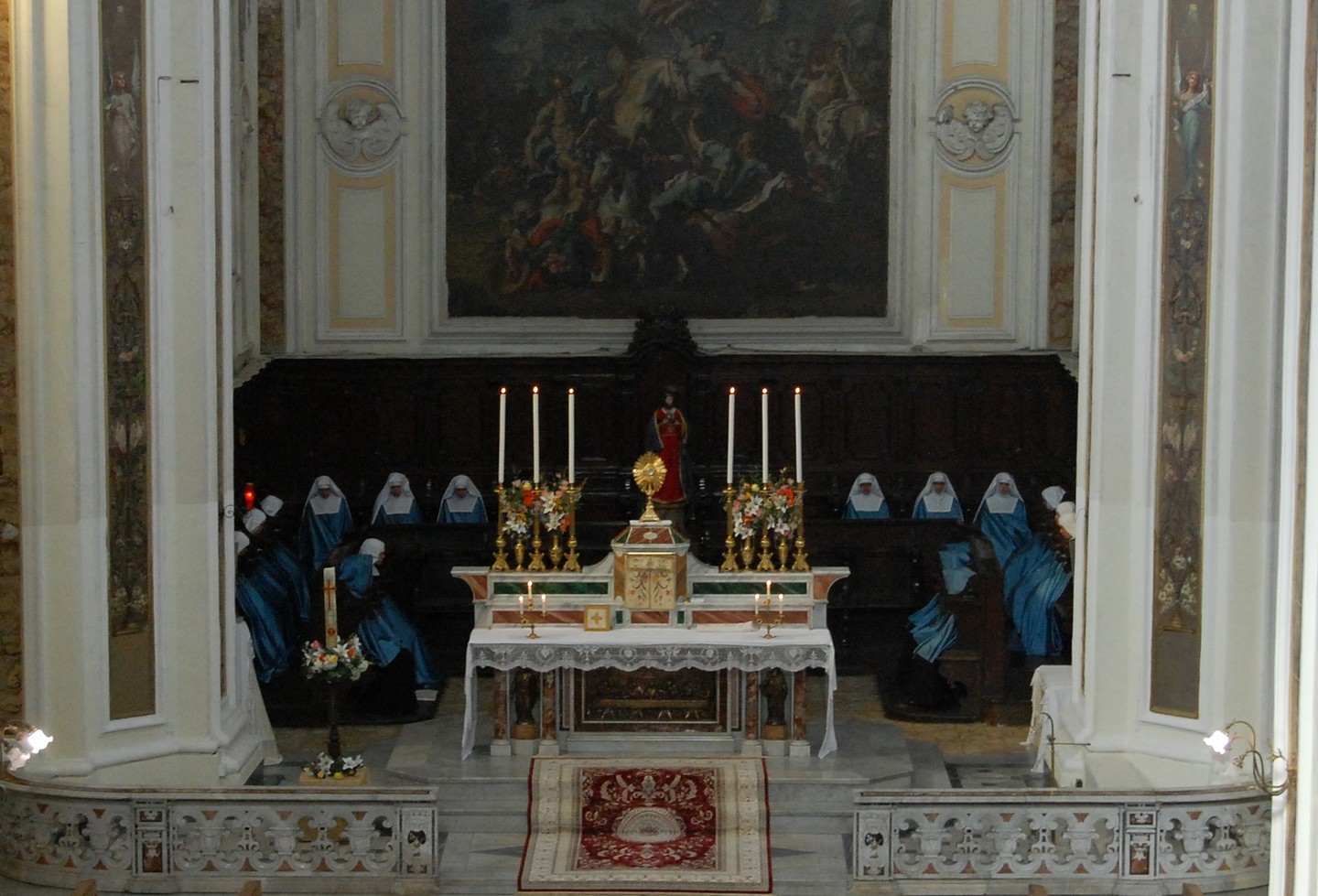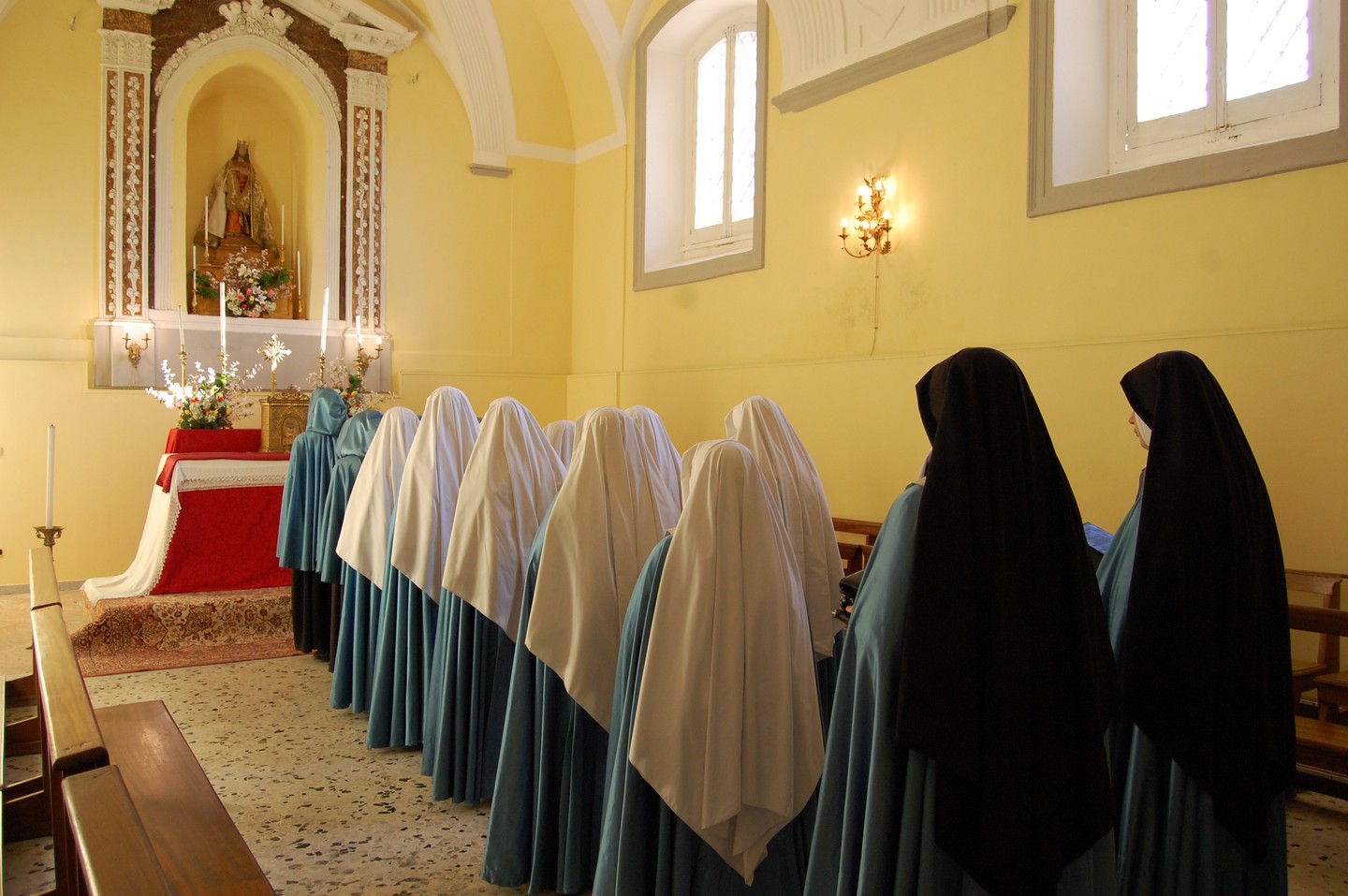A Day in the Life of a sister Adorer
The Office of Lauds and Meditation
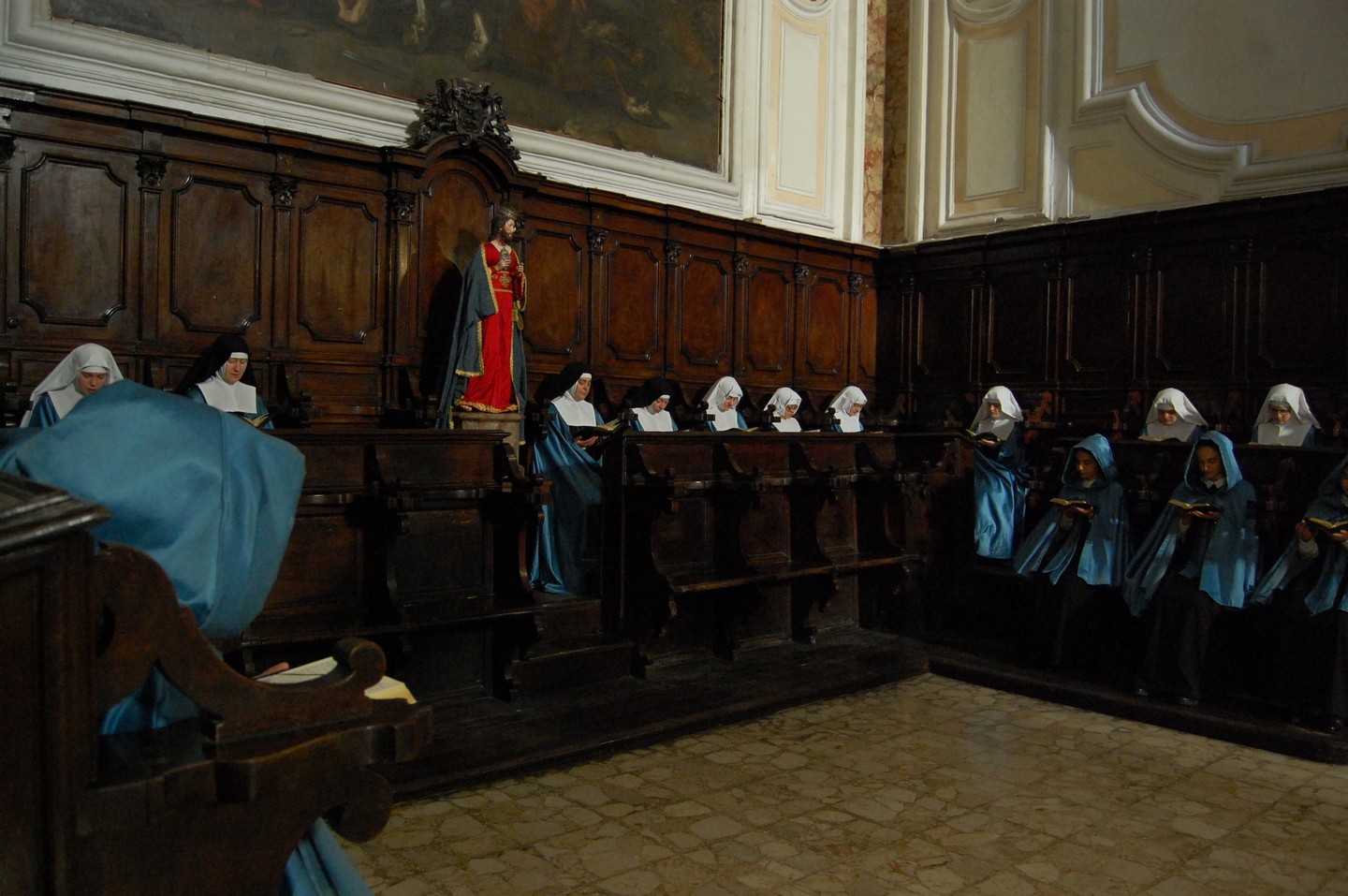
At 7:30 am, the sisters go to the chapel to renew their consecration to the Royal Heart. This prayer was composed on the same model of the consecration to the Blessed Virgin that is prayed by the canons and seminarians. These are the first words of the day :
“In the presence of the Most Holy Trinity and of the Immaculate Blessed Virgin, Queen of Angels and of men, our Mother, and taking Heaven and Earth as our witness, we give ourselves without reserve to the Love of Thy Royal Heart, O Lord[…]We also consecrate to Thee the value of our good actions, past, present, and future, leaving to Thee the entire and full right of disposing of us and of all that belongs to us.”
After this prayer, the Office of Lauds is sung recto tono. Lauds is the office of praise; all creation unites with the human voice to praise the Creator, just like in the Canticle of the Three Young Men in the book of Daniel.
“It is enough that when we go to the choir, we go with a desire to praise God, to bless Him and to give Him thanks; for all the psalms, hymns, and canticles that we say were formed either to praise God for His greatness, to bless Him for His mercy, or to give Him thanks for His many graces.” Saint Jane de Chantal, Exhortations, III.
You do well, my dear daughters, wanting to learn more about prayer and in asking that I say a few words to you about it: it is the channel that unites the heart of a sister with the Heart of God. Prayer calls forth torrents of grace, which fall and rise from God to us and from us to God. It is the first act of our faith; and thus, what the Apostle says of faith, that without it, it is impossible to please God, must also be said of prayer.” Saint Jane de Chantal, Entretiens, XXX
Holy Mass
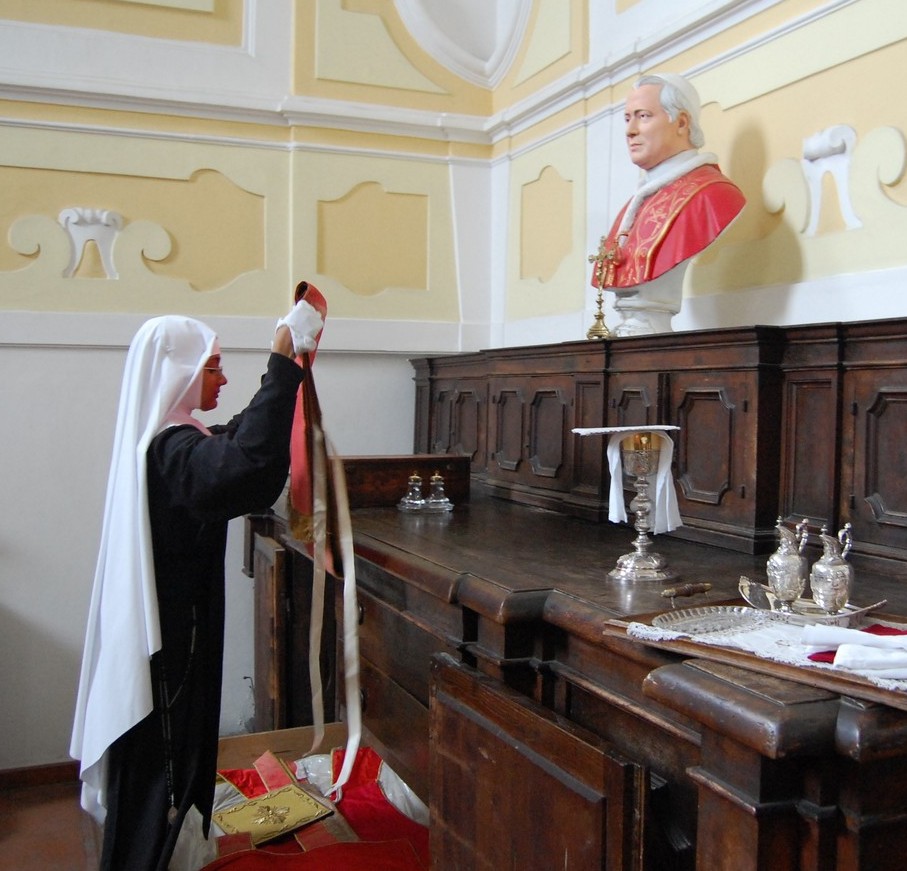
After Lauds, Holy Mass is celebrated in the convent church. Holy Mass is the “sun and summit of spiritual exercises,” according to the expression of Saint Francis de Sales, the high point of the day and of a life that wants nothing more than to be a continual offering in imitation of the Sacred Host.
Mass is followed by a time of thanksgiving, the privileged moment of union between a soul and its Creator.
On Sundays and feast days, the sisters in Naples have the great privilege of chanting for three Masses: a Solemn High Mass at the convent church as well as two High Masses, one at the convent and one at the Institute’s apostolate in Naples.
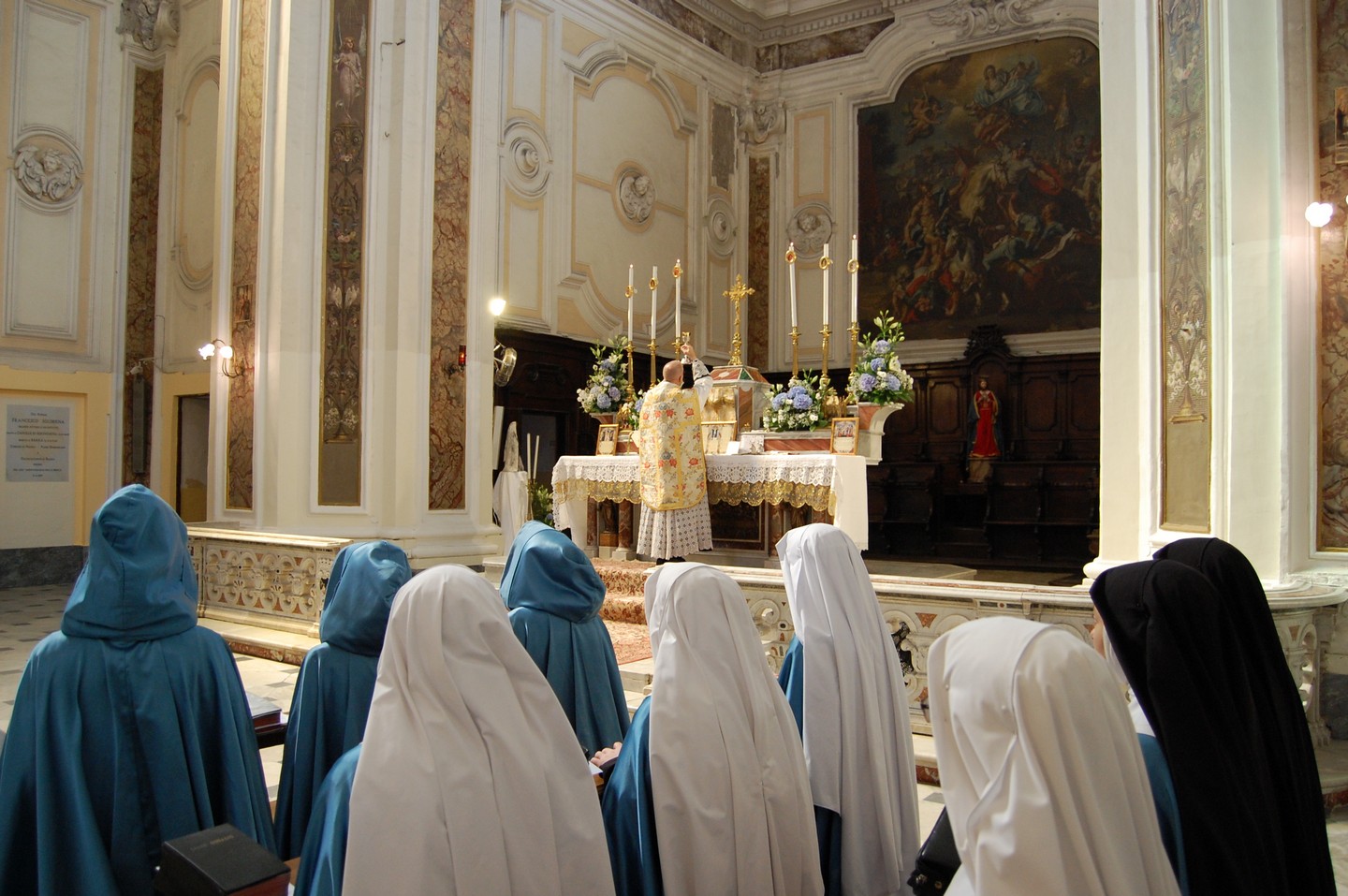
The Sister Adorers share a common vocation with the canons of the Institute of Christ the King in offering worship to God. The solemn liturgies which take place at the novitiate are, therefore, an occasion for the sisters to unite their adoration with that of the priests and seminarians.
The sisters line up in front of the statue before they make their reverence
and process into the chapel for the Divine Office
Daily Tasks, Chores, and Studies
After Holy Mass, the Blessed Sacrament is exposed in the convent church. The sisters spend one hour of meditation in the intimacy of the Real Presence of Our Lord whom they have just had the privilege of receiving in Holy Communion.
After meditation, a day of work begins. At the Novitiate, A large part of each day is consecrated to classes, study and intellectual formation. There are two classes in the morning and two in the afternoon, including religious formation, Gregorian chant, Church Doctrine, Church History, Sacred Scripture and Tradition, Latin, The Life of Prayer, and The Consecrated Life – the three vows of poverty, chastity and obedience. This is an essential aspect in the formation of the novices who seek to advance ever more in the love of God and in their religious vocation.
In our various houses, the sisters devote themselves to works more oriented towards the apostolate such as catechism classes, retreat services, activities with young girls, visits to retirement homes, etc."
 |
Retreat services |  |
| Catechism classes | 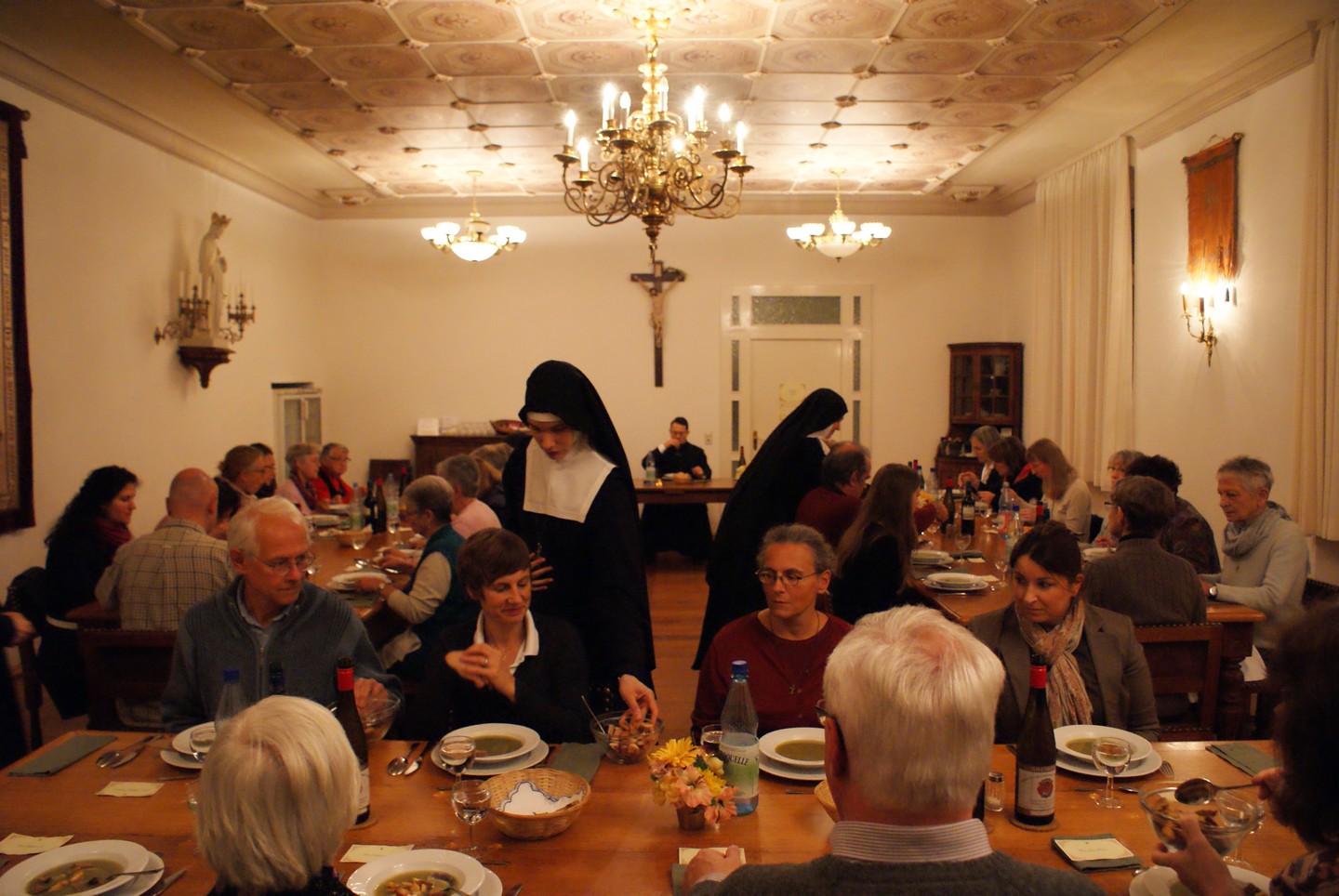 |
Activities with young girls |
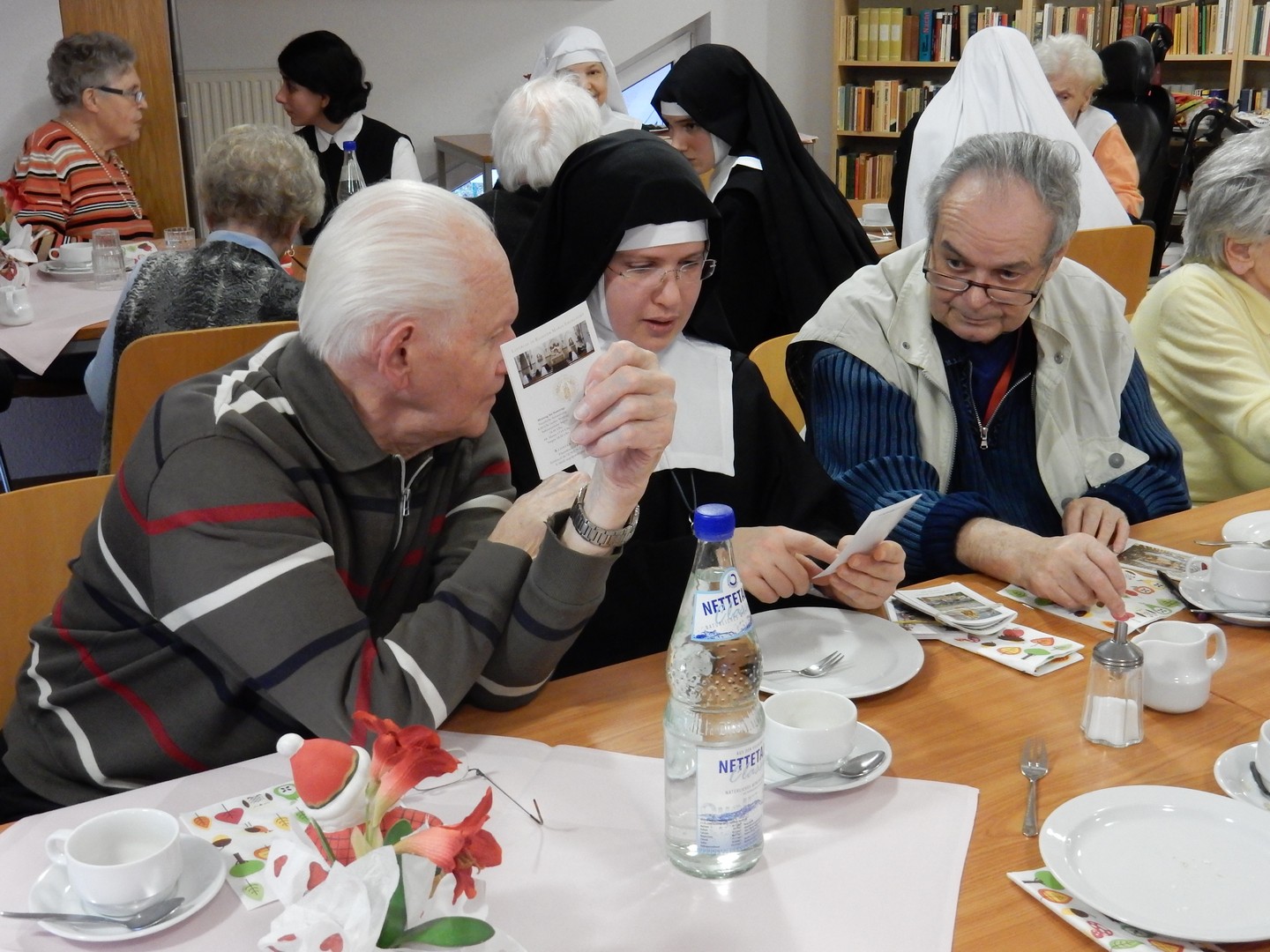 |
Schools | 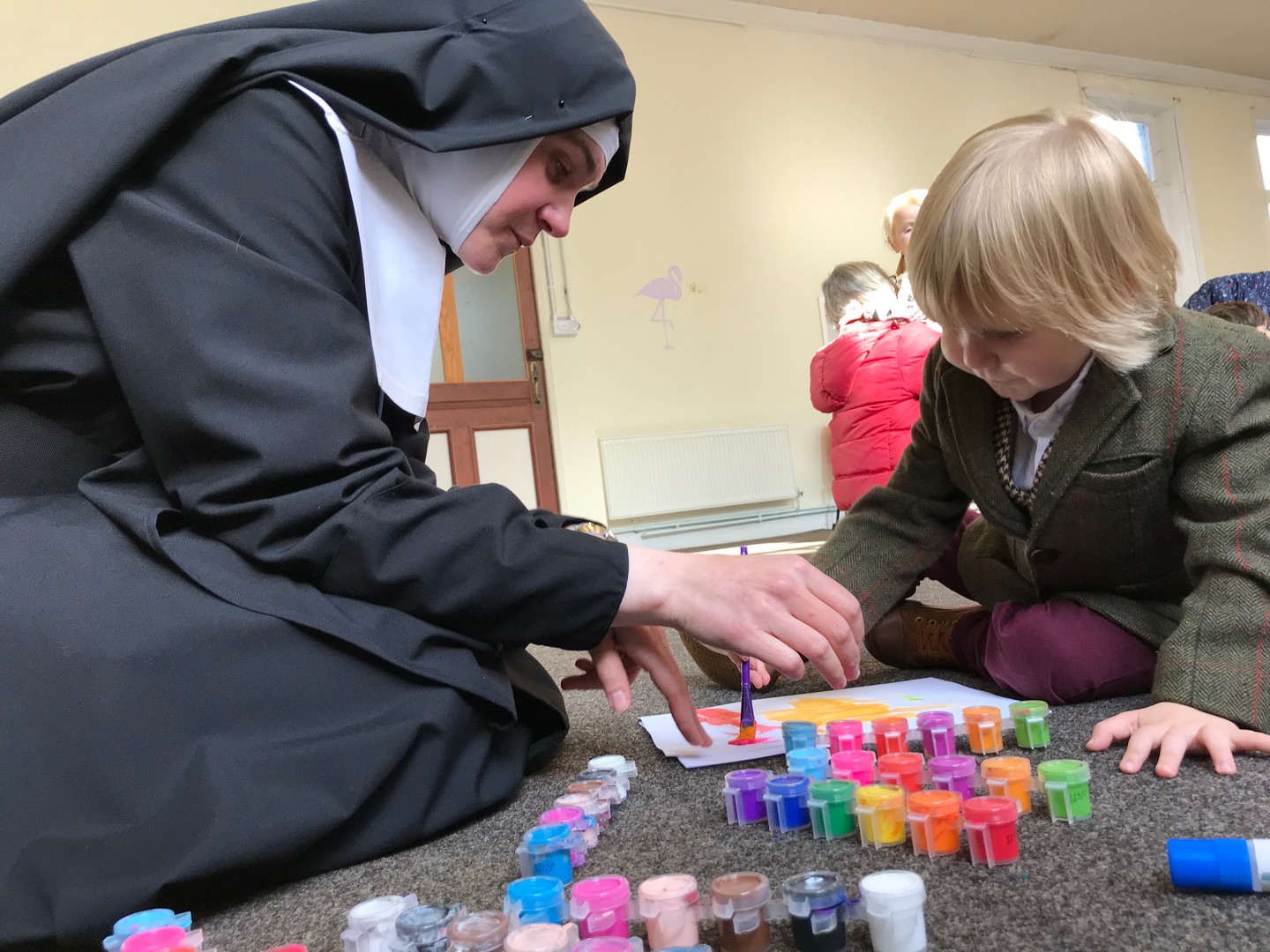 |
| Visits to the elderly |  |
Activities with children |
After prayer, study or apostolate, the sisters devote time each day to the practical and manual work needed for the upkeep of the house, from cooking and cleaning, to taking care of the sacristy and sacred linens, to undertaking large projects like painting and plastering that are never lacking in an ancient convent building and property. It is through attention, energy, and generosity that the sisters show their love of God concretely in the care they take of everything He has entrusted to them.
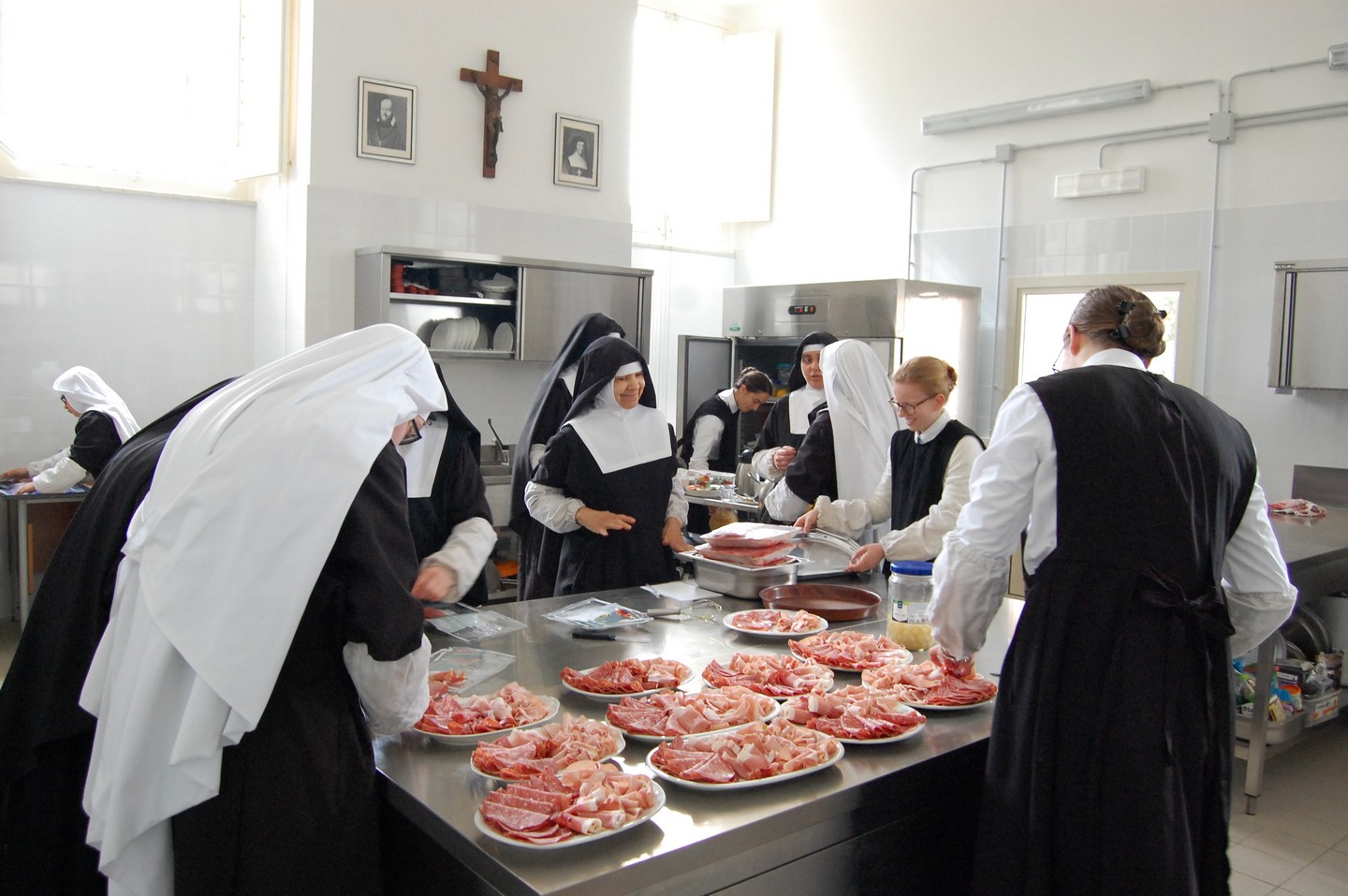 |
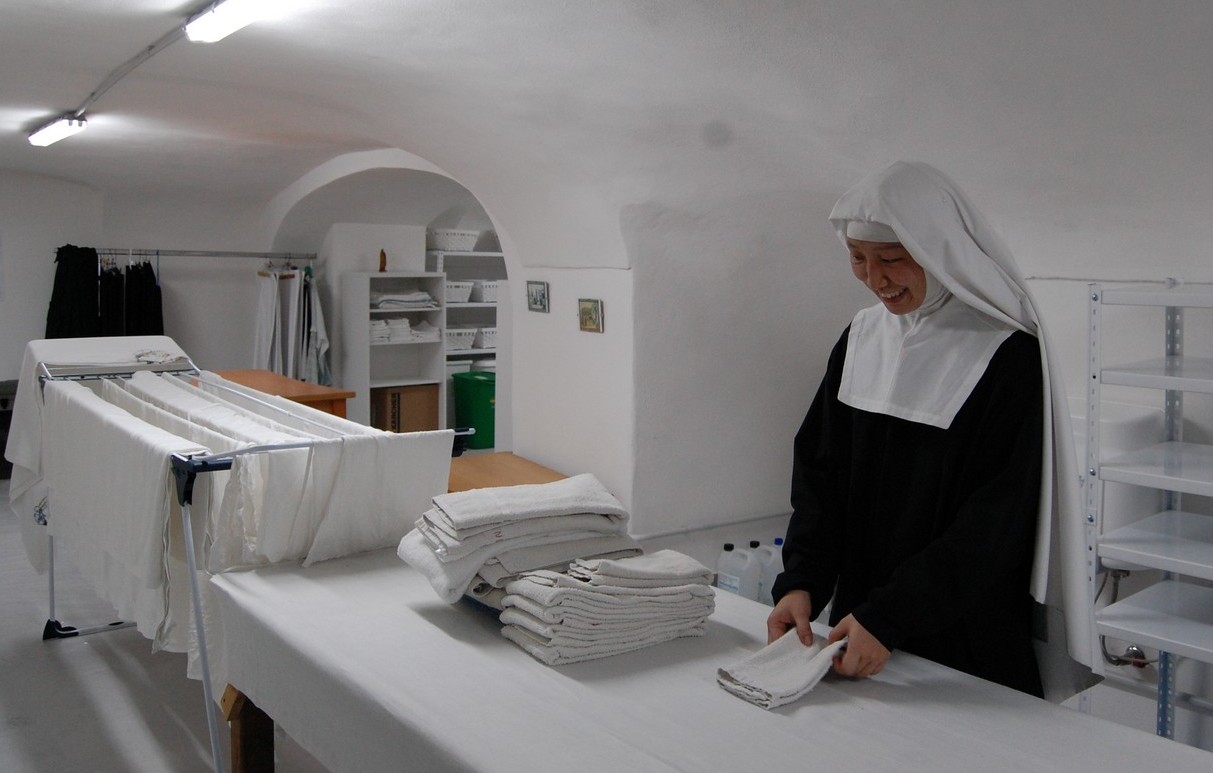 |
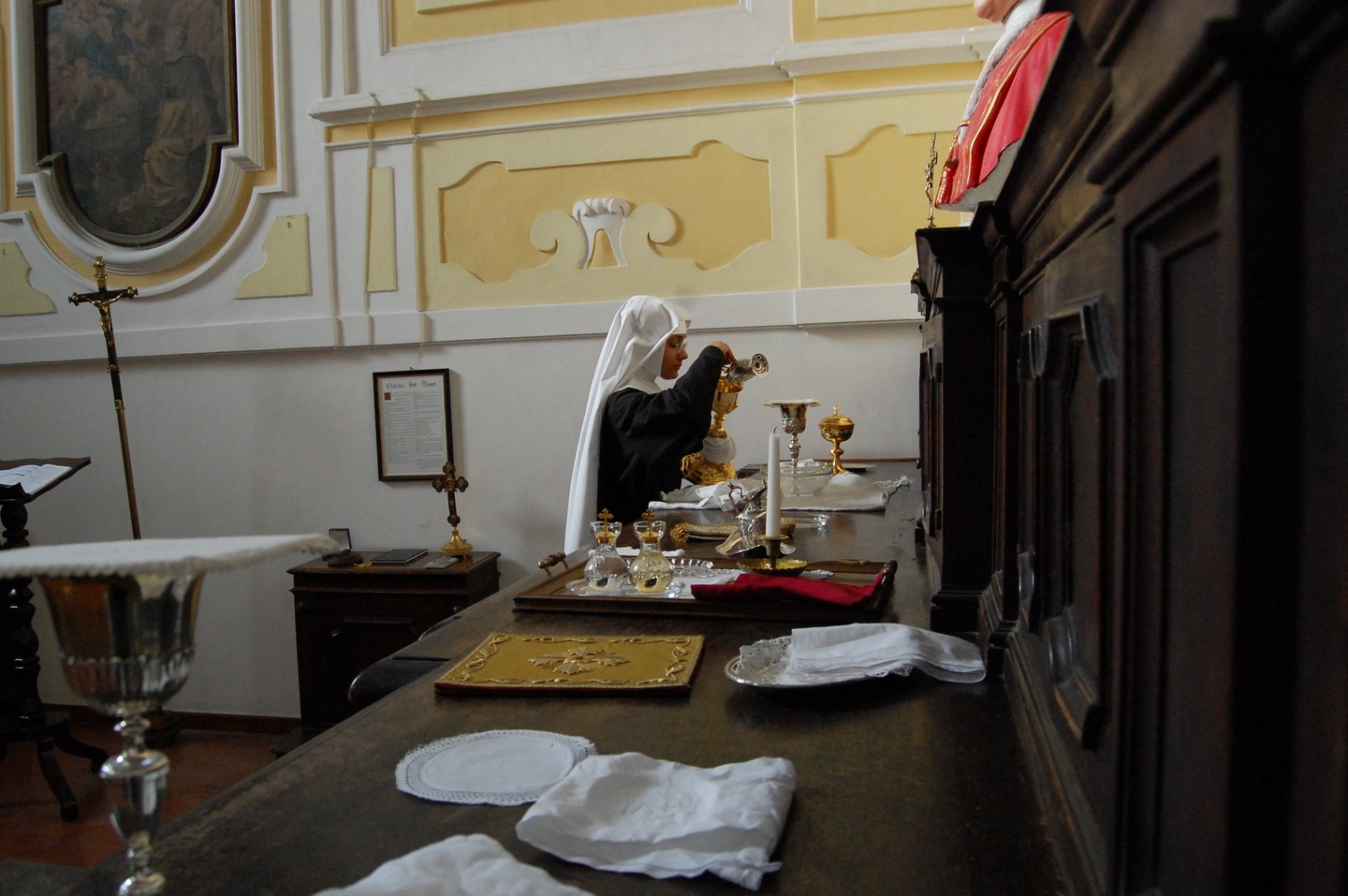 |
|
Cooking |
Laundry |
Sacristy |
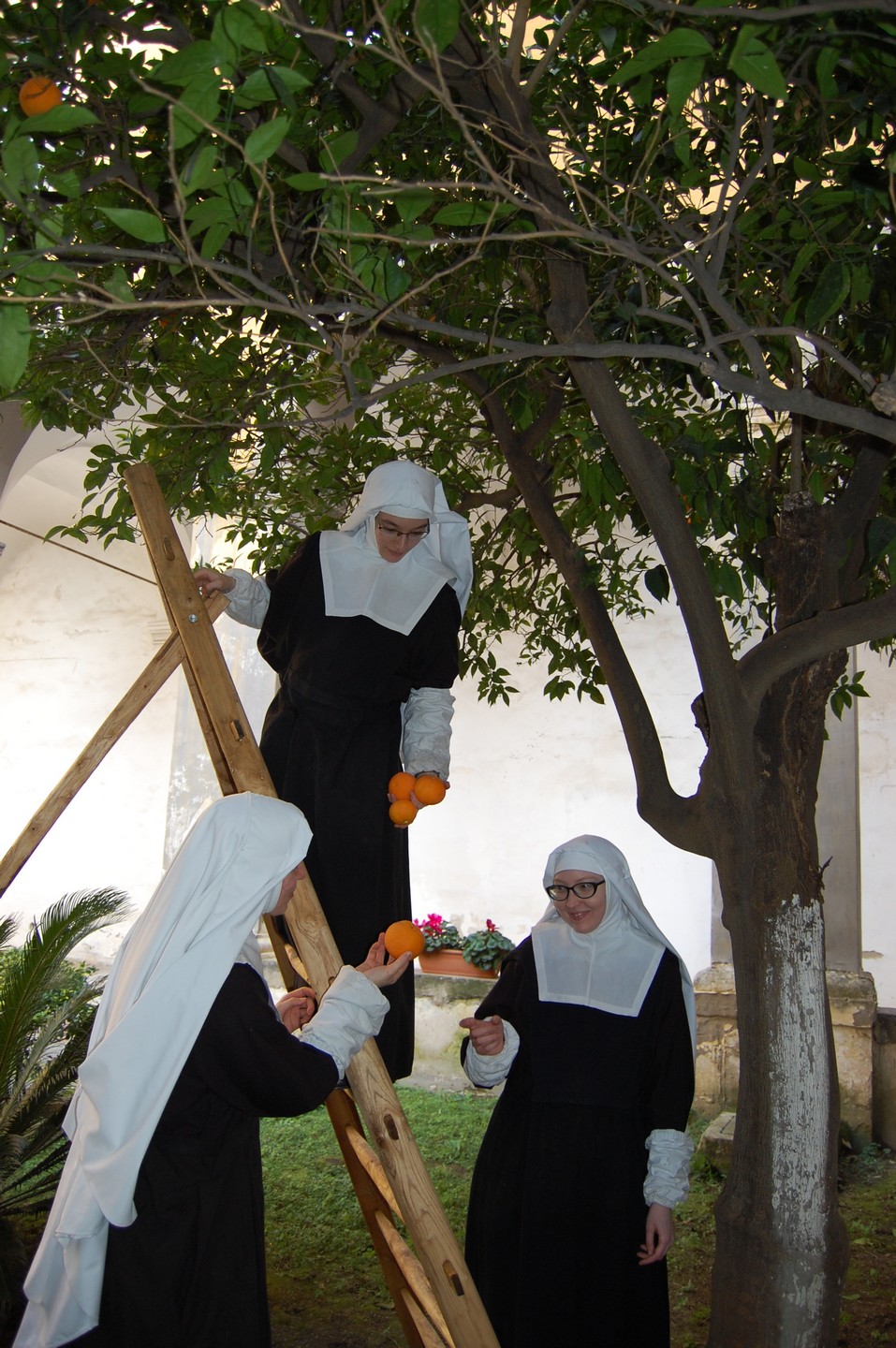 |
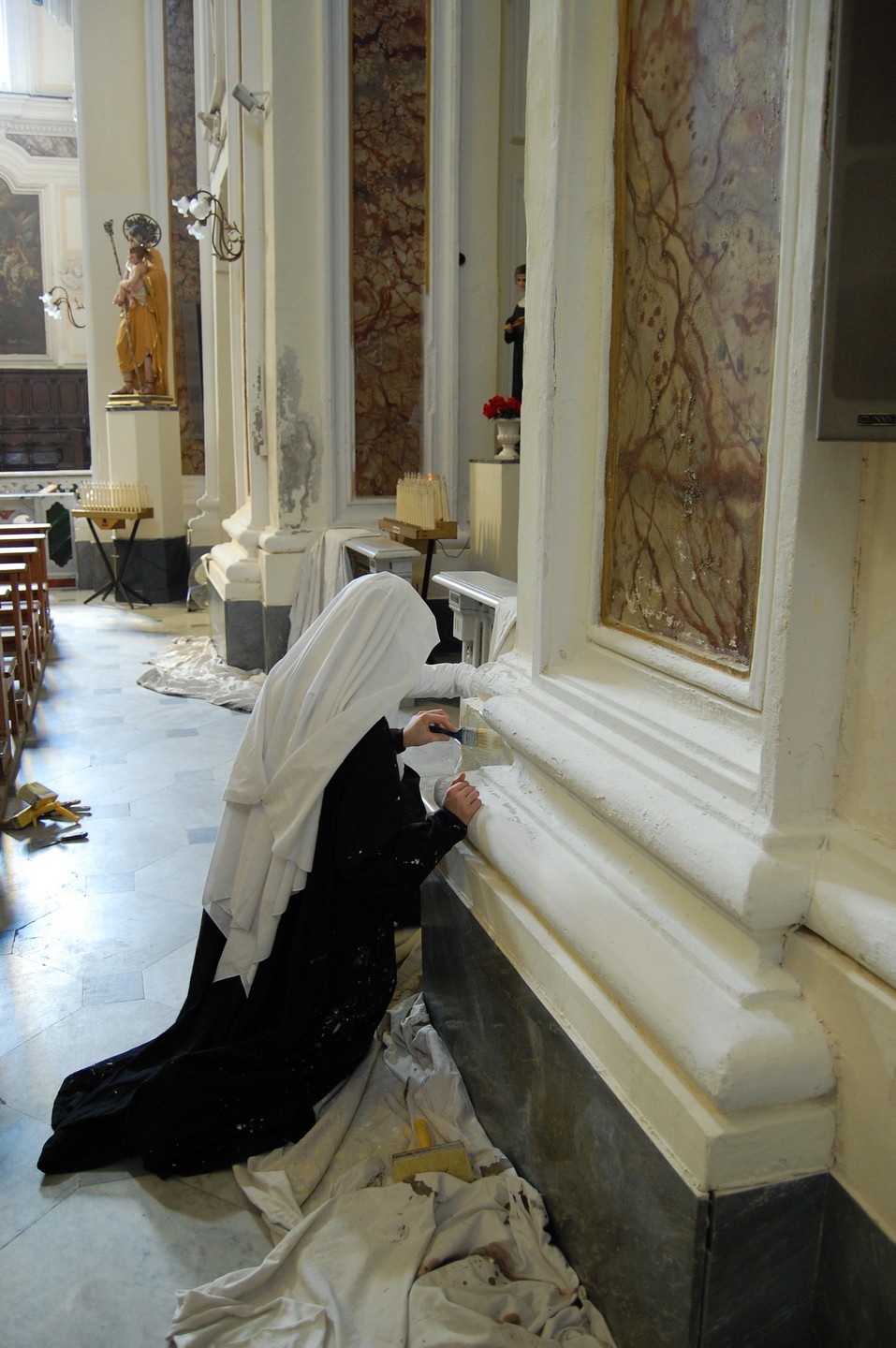 |
|
Fruit harvest |
Painting |
|
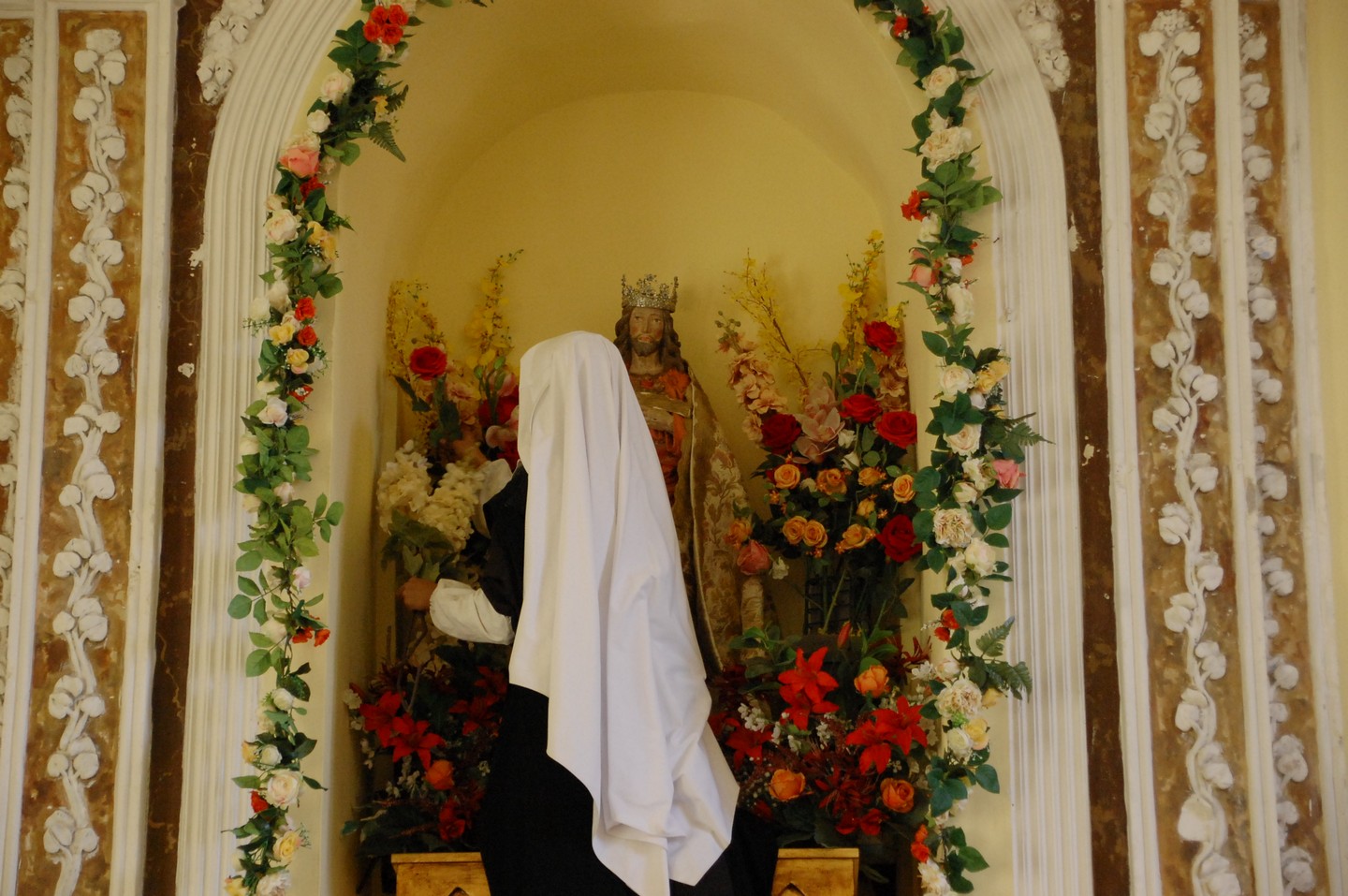 |
|
Interior decorations |
|
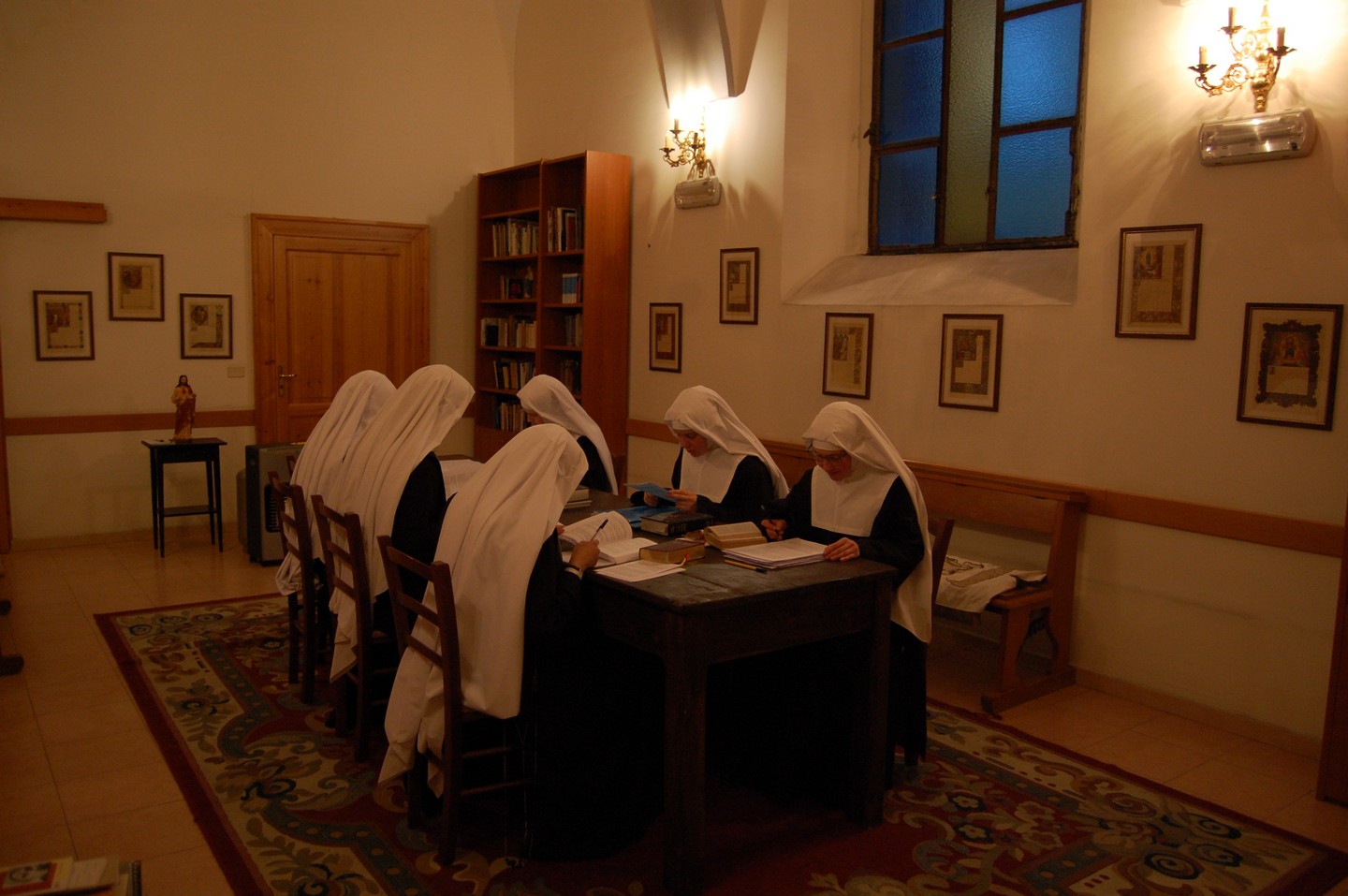 |
|
|
Studies |
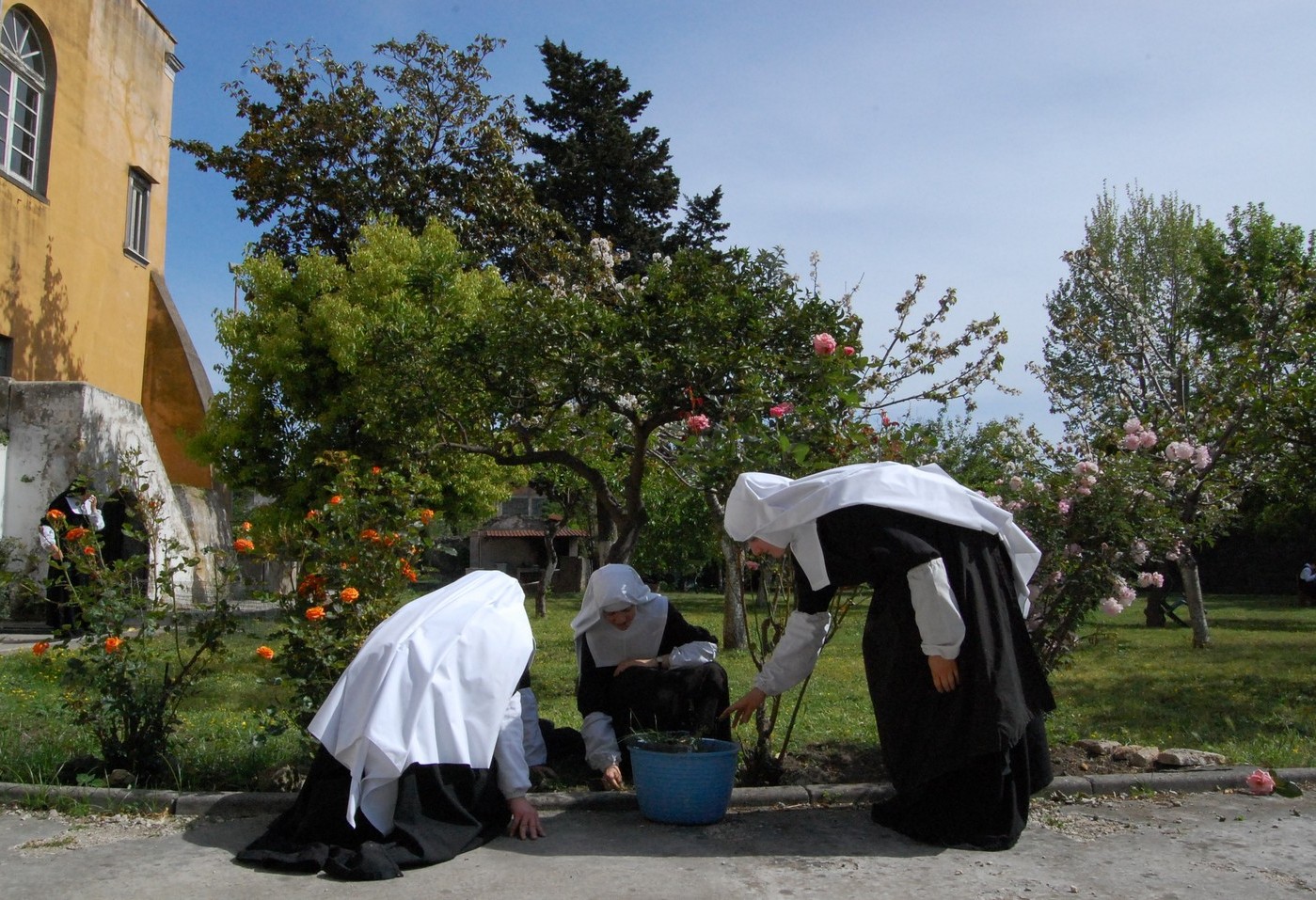 |
« But which has the more force, I pray you; love, to make us look upon the well-beloved, or the sight to make us love him? Knowledge, Theotimus, is required for the production of love, for we can never love what we do not know; and accordingly as the attentive knowledge of good is augmented, love is also augmented, provided there is nothing to hinder its activity. Yet it happens often, that knowledge having produced holy love, love does not stay within the limits of the knowledge which is in the understanding, but goes forward and passes very far beyond it. » |
| Gardening | |
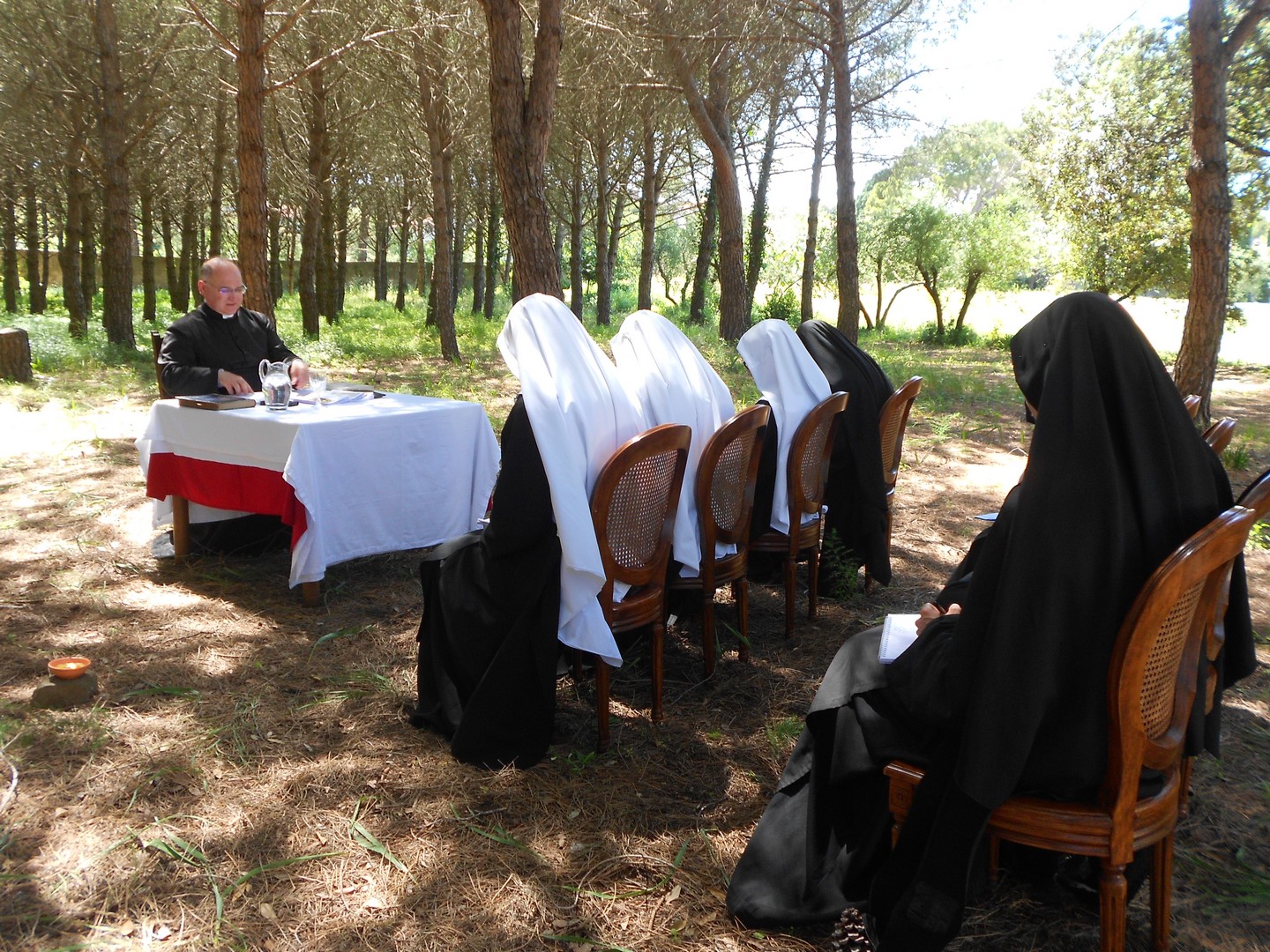 |
|
| Spiritual conference in the garden |
Adoration
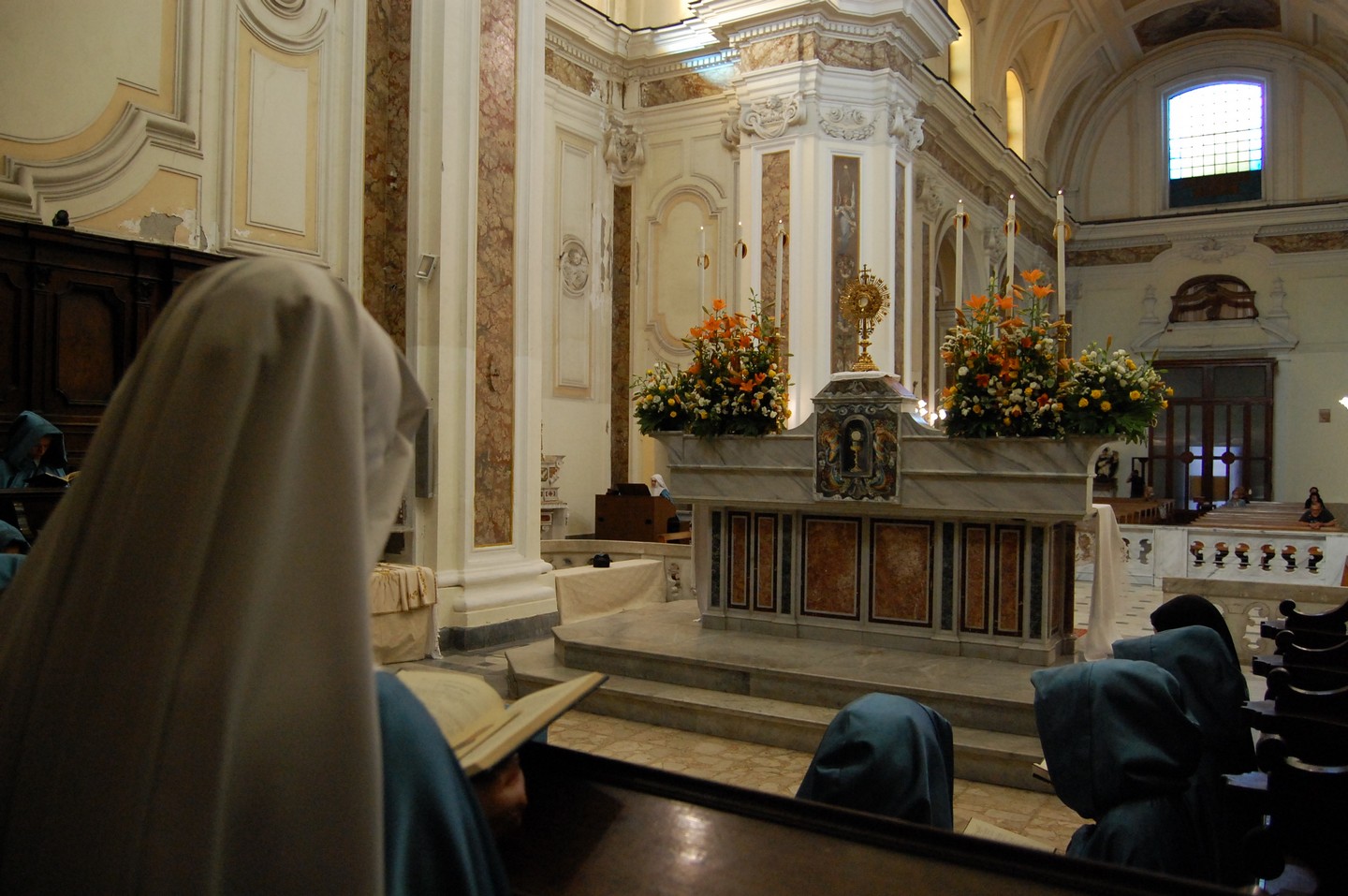
From Holy Mass in the morning until Vespers in the evening, the sisters take turns in adoration before the Blessed Sacrament. In these precious moments, it is not so much the sisters who guard Our Lord in the Blessed Sacrament as it is He who guards them.
Excerpt from the Rule: “In adoration before the monstrance the [Sister Adorers] will contemplate the Divine Victim with Whom they wish to be identified. They will,adore their King in the Blessed Eucharist by which He wishes to reign. As before their King seated upon His throne, they will present their homage to Him: God hidden under the veil of the host, adored by all the angels, upholding the universe, whose throne is unto all ages, crowned with glory and honour, adorned with a mantle of light, to Whom all is subject, Eternal Love who loved them first.
The contemplation of the King of kings increases their desire for beauty in the liturgy and in the adoration of Him who is crowned with glory and honour in heaven; the summit of their adoration is the Holy Mass and the Divine Office sung in the presence of the Divine Host as they pray in union with the Church’s own prayer.”
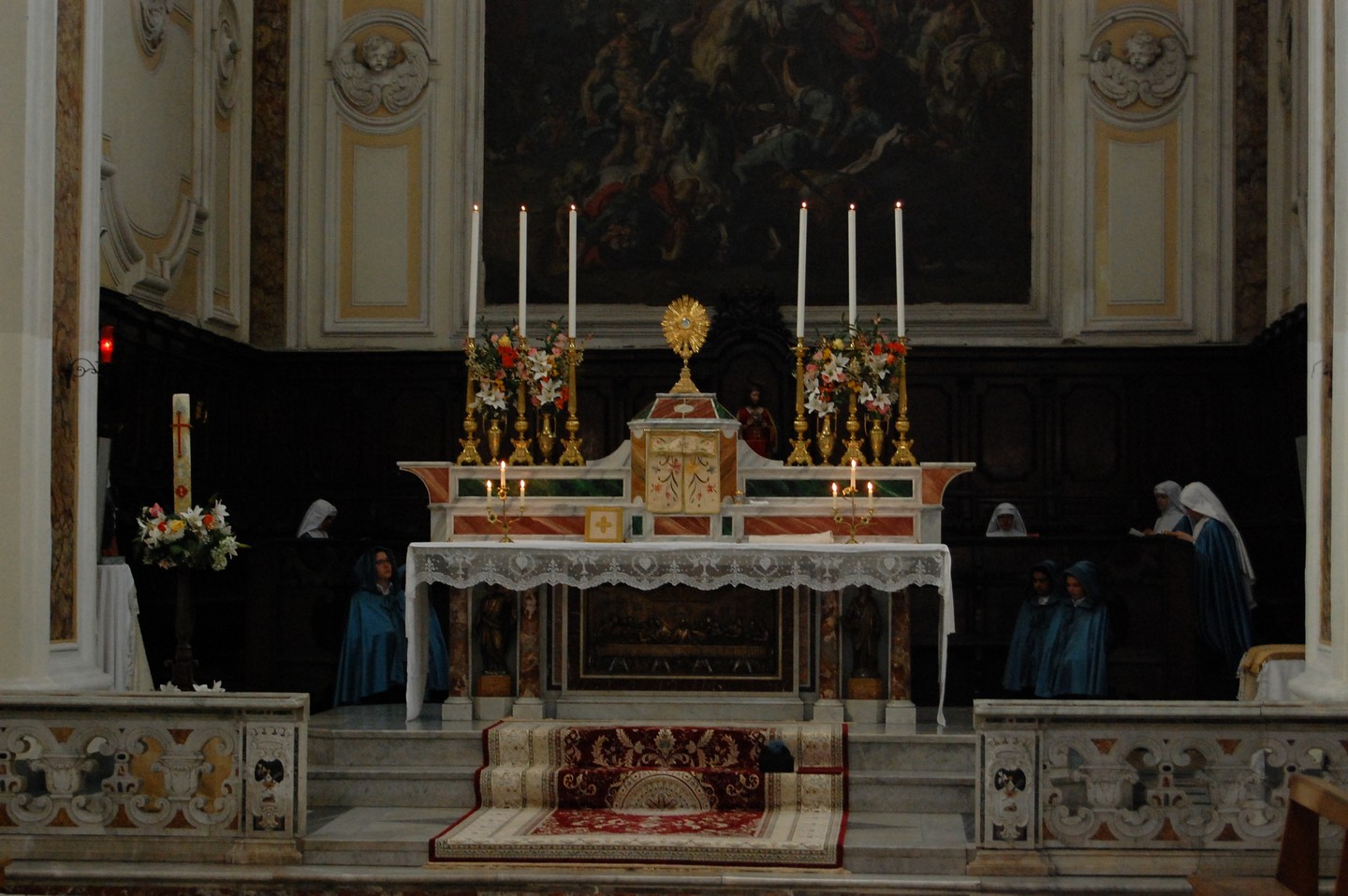
Before Jesus in the Blessed Sacrament, the sisters offer the prayer intentions entrusted to them by friends and benefactors. Do not hesitate to send the sisters your personal intentions!
At 6 pm, Vespers are sung before the Blessed Sacrament exposed on the altar. At the end of the office, the sisters sing for Benediction of the Blessed Sacrament. The Sacred Host is then reposed in the tabernacle by the priest.
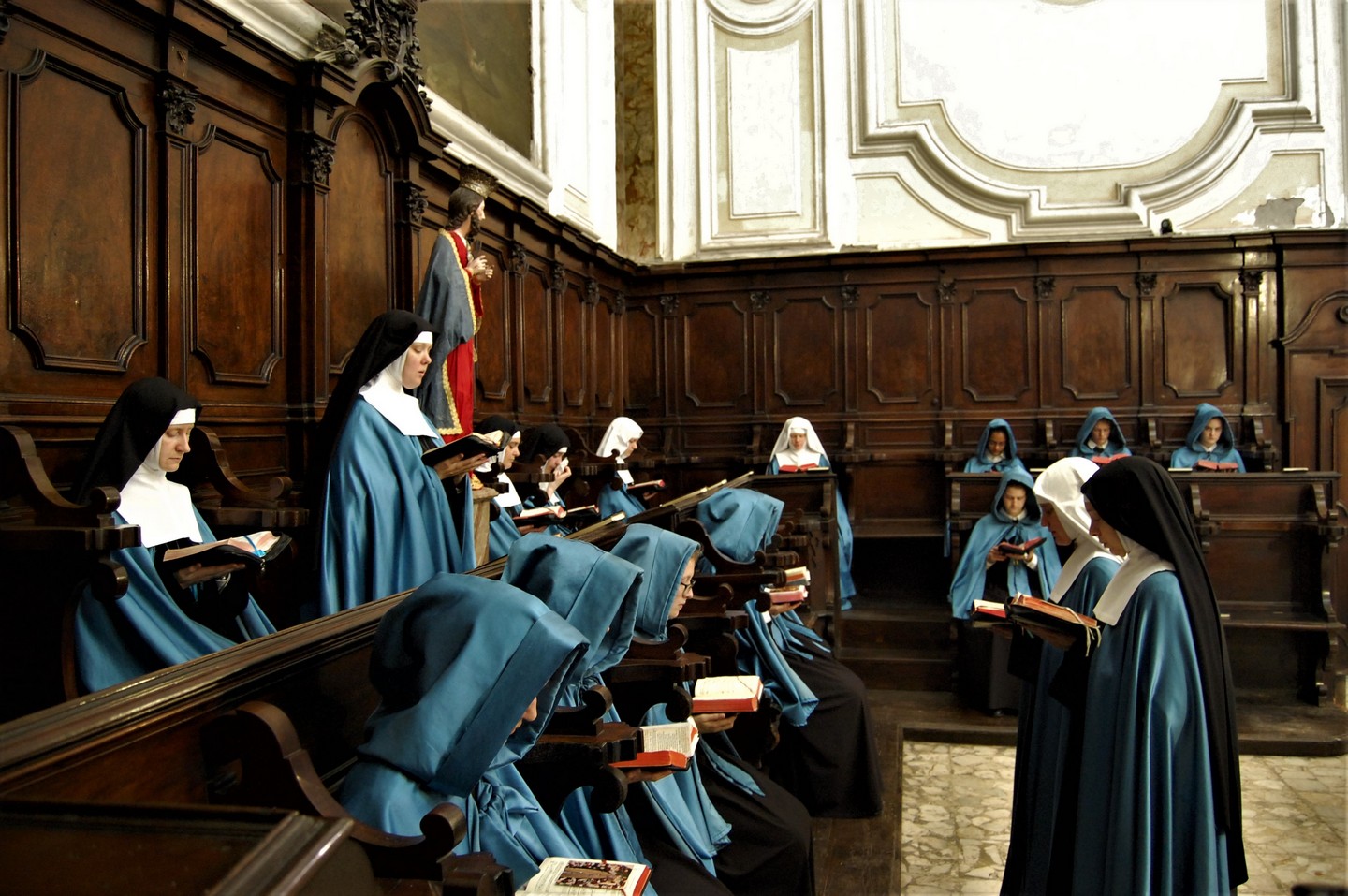
Vespers in front of the Blessed Sacrament exposed
Communal Meals
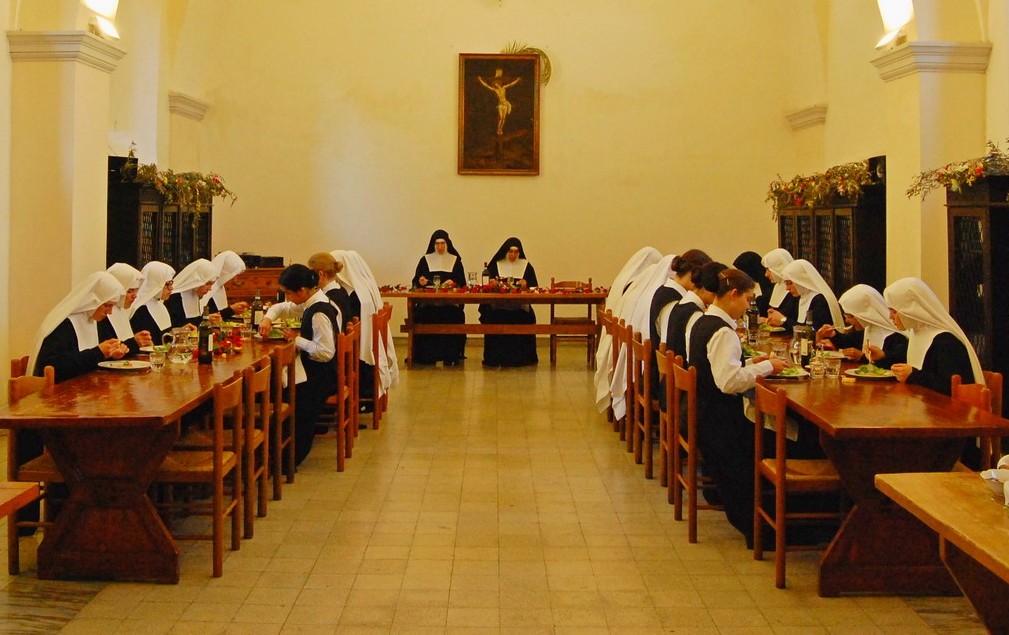
Christianity is the religion of the Incarnation: we are at the same time spiritual and corporal beings. Just as prayer and the Sacraments nourish the soul, the body must likewise be nourished. For this reason communal meals are an important part of life 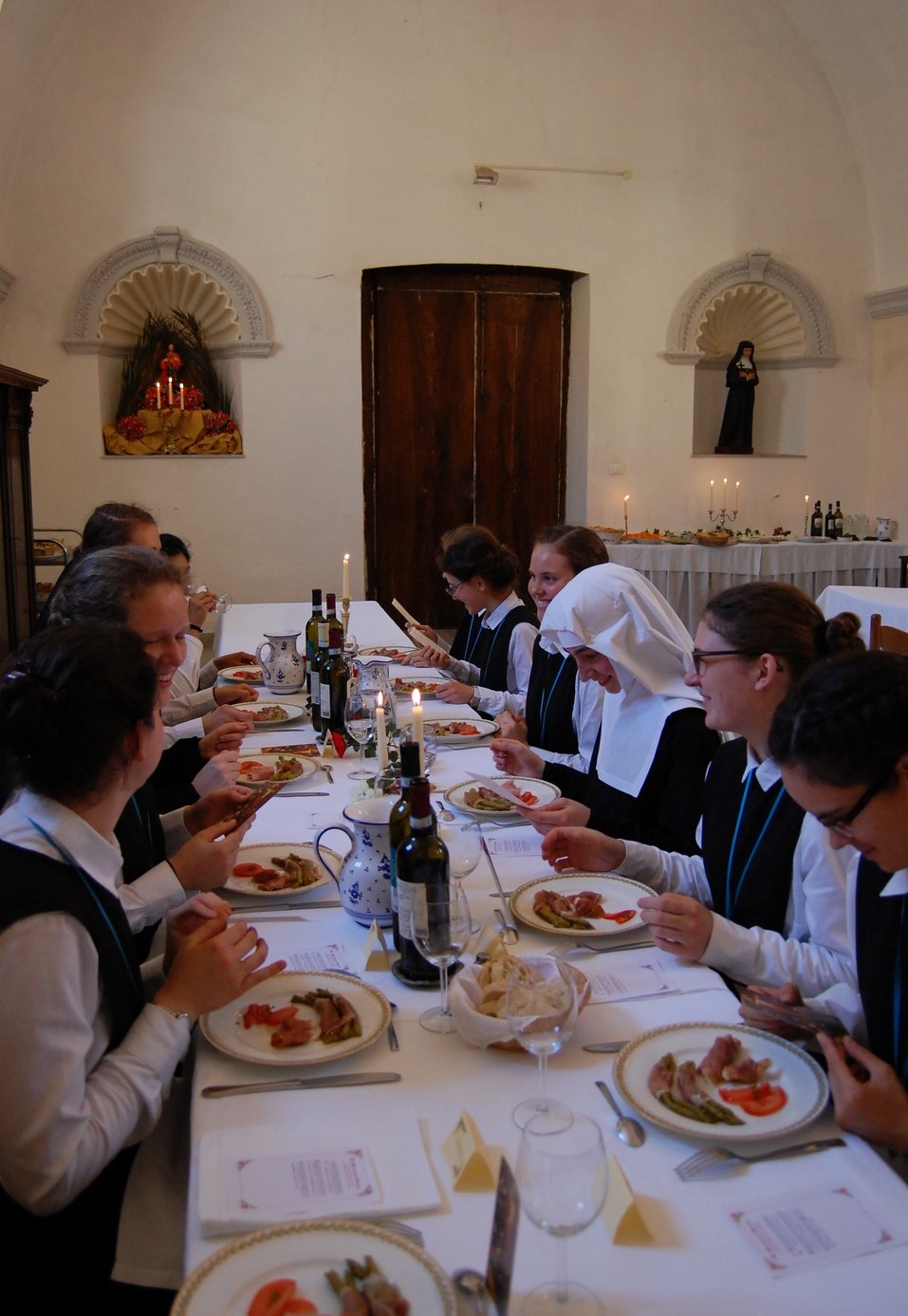
at the convent.
Lunch and dinner are taken in silence in the refectory, while spiritual or historical texts or the lives of saints are read for the edification of all. The sisters take turns fulfilling mealtime duties such as reading, table service and dishwashing.
Recreation
An important opportunity to practise fraternal charity, recreation allows charity to fully blossom in community life. It usually takes place outdoors in the spring and summer and can include various creative activities such as embroidery, crochet, making rosaries and learning different polyphonic pieces of music.
According to Saint Thomas Aquinas : “The law of love is a law of fire which shines, which burns, and which lifts us towards heaven; it is like a burning coal for those who begin, a flame for those who advance, and pure light for those who are perfect.”
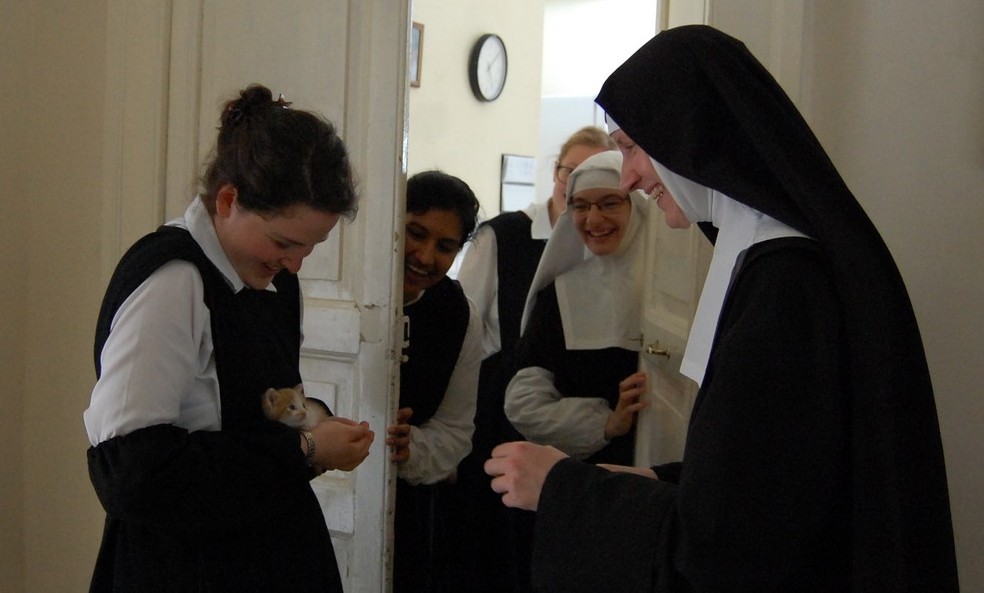 |
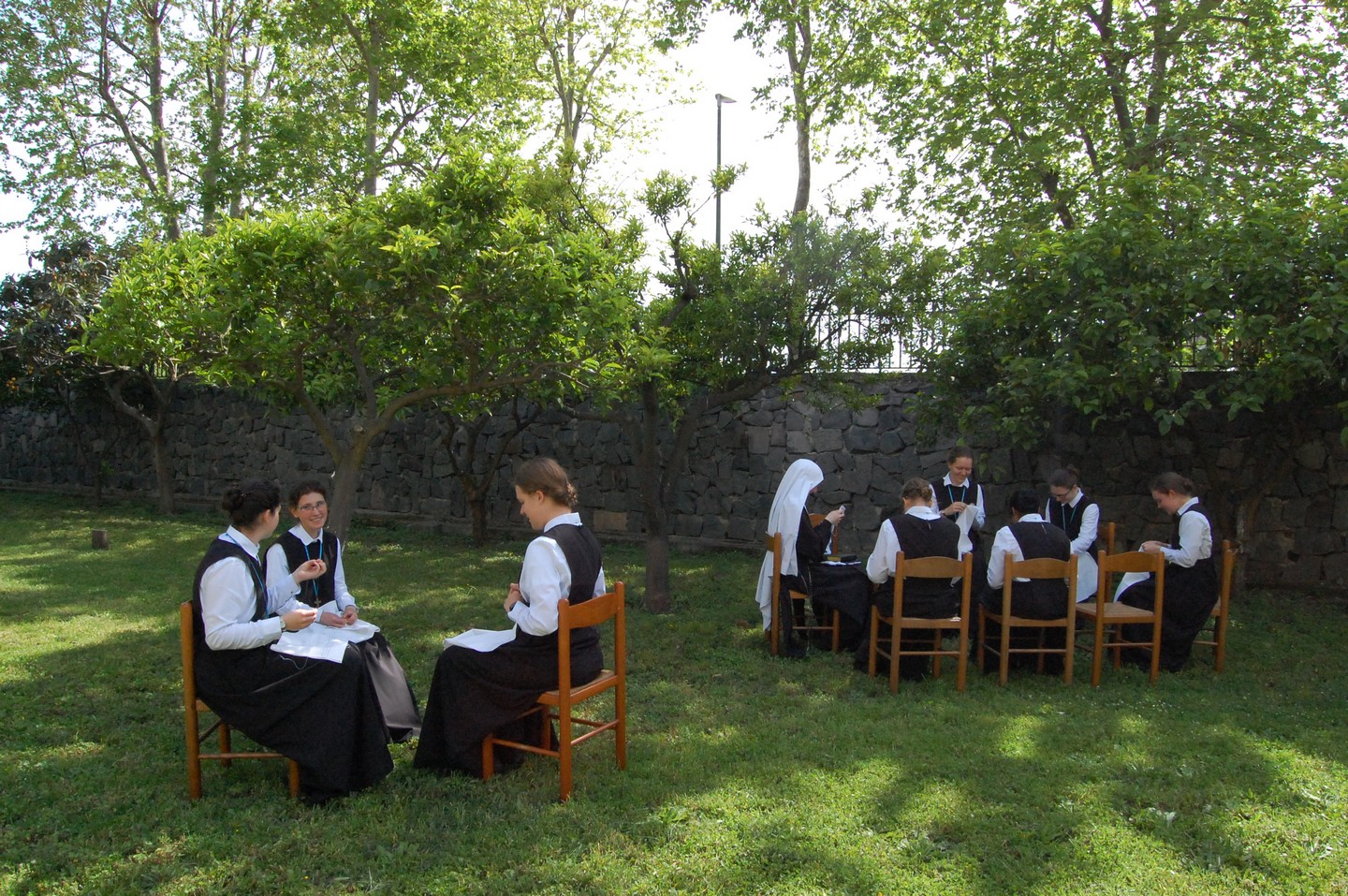 |
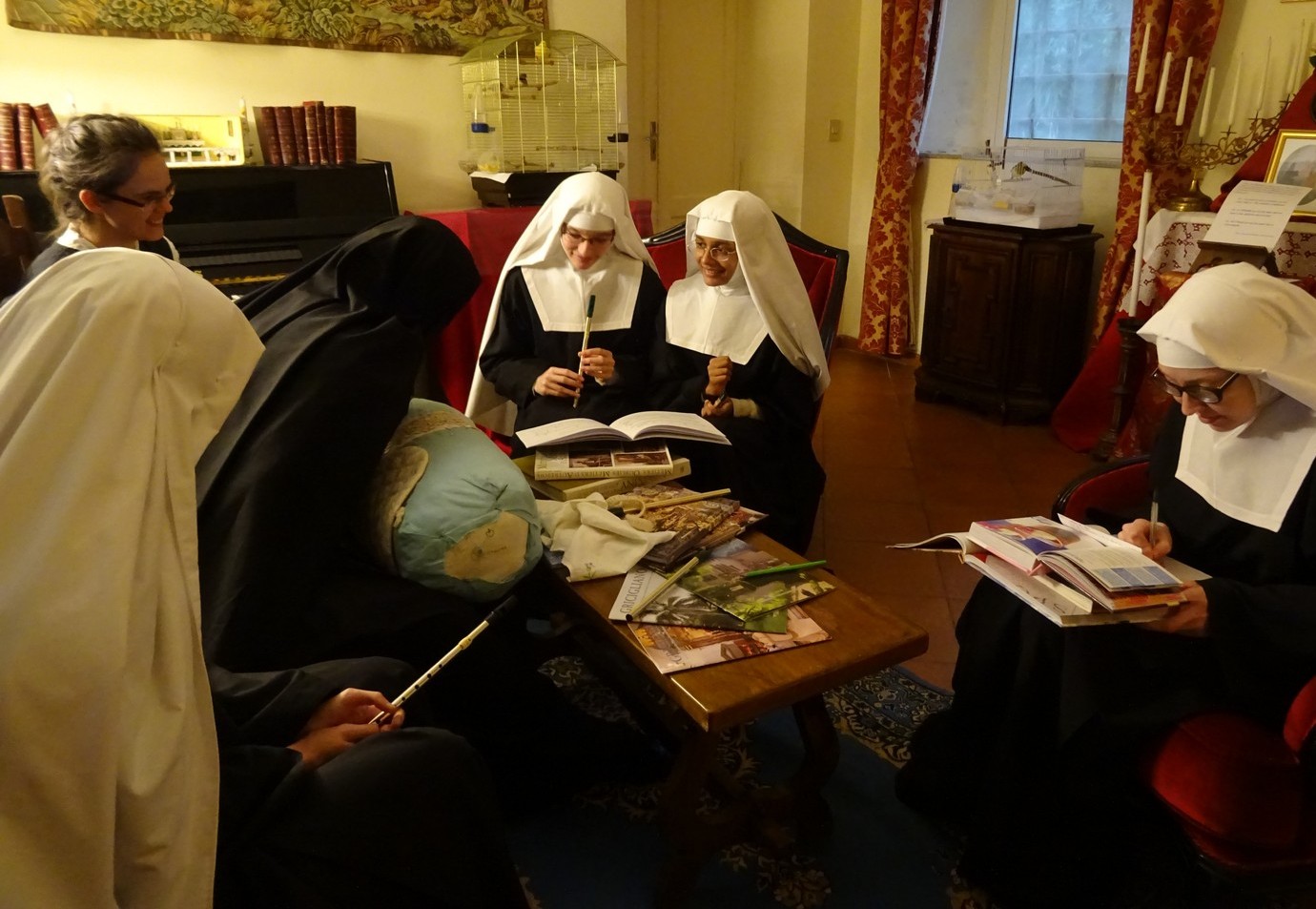 |
The Rosary
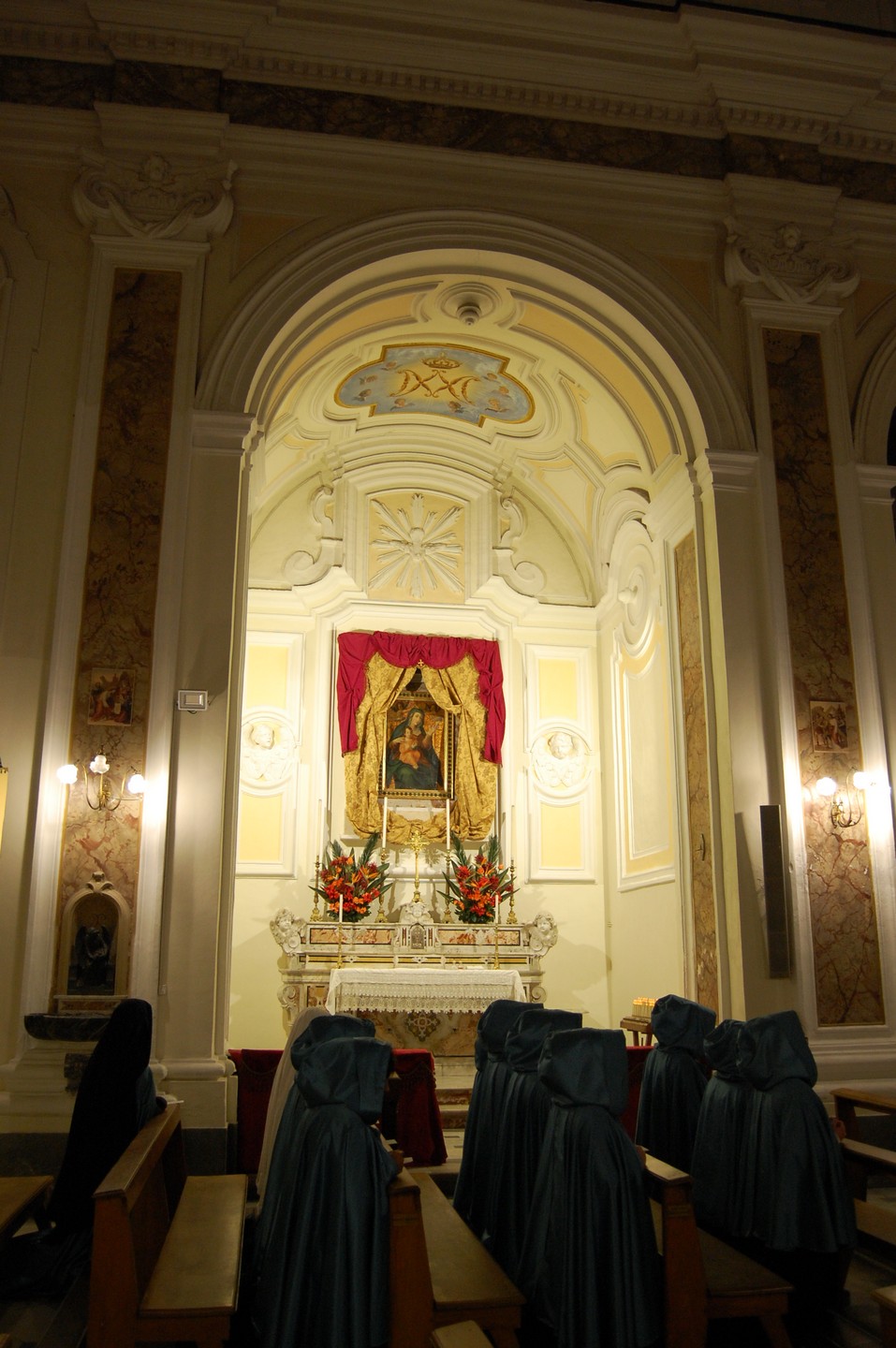 The recitation of the Rosary in community follows recreation at the beginning of the afternoon. “I could not tell you all of the notes of which this song of praise is composed; indeed, I would not finish; this great and unceasing whisper of Ave Marias, the various ways by which we can recite it… even when the recitation of Aves is mechanical or distracted, but nevertheless led by a profound sentiment, an instinct from the heart where filial devotion for Our Lady may veil itself, but does not die, a devotion that we would not let die…” Dom Guillerand o. cart.
The recitation of the Rosary in community follows recreation at the beginning of the afternoon. “I could not tell you all of the notes of which this song of praise is composed; indeed, I would not finish; this great and unceasing whisper of Ave Marias, the various ways by which we can recite it… even when the recitation of Aves is mechanical or distracted, but nevertheless led by a profound sentiment, an instinct from the heart where filial devotion for Our Lady may veil itself, but does not die, a devotion that we would not let die…” Dom Guillerand o. cart.
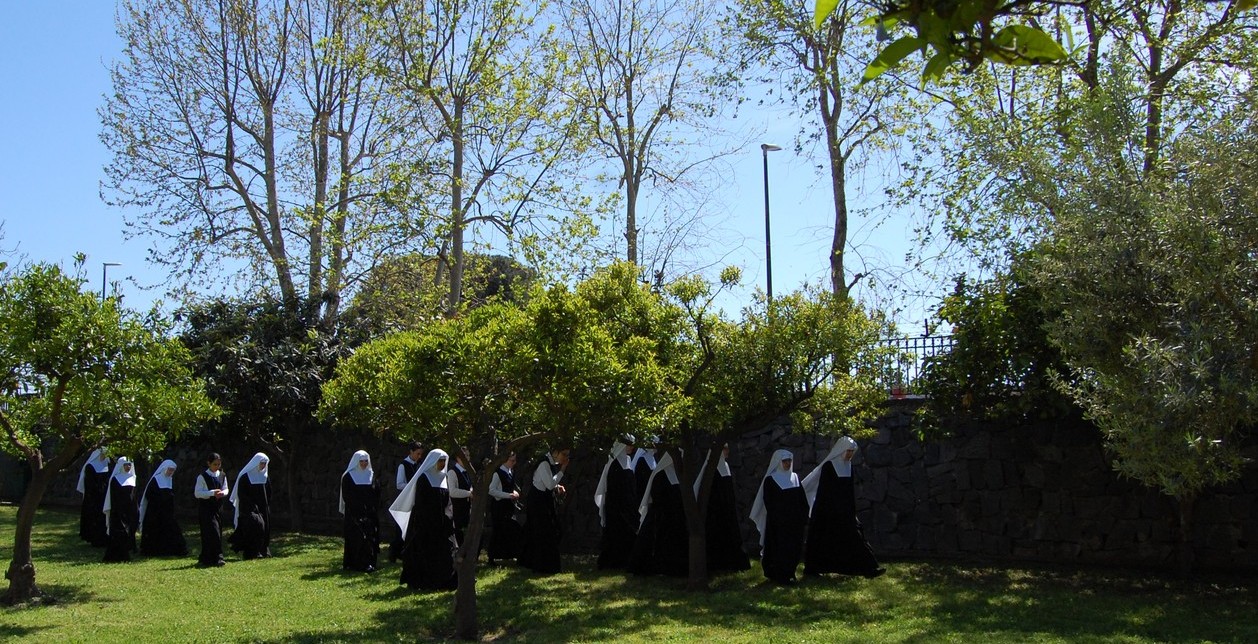
Gregorian Chant
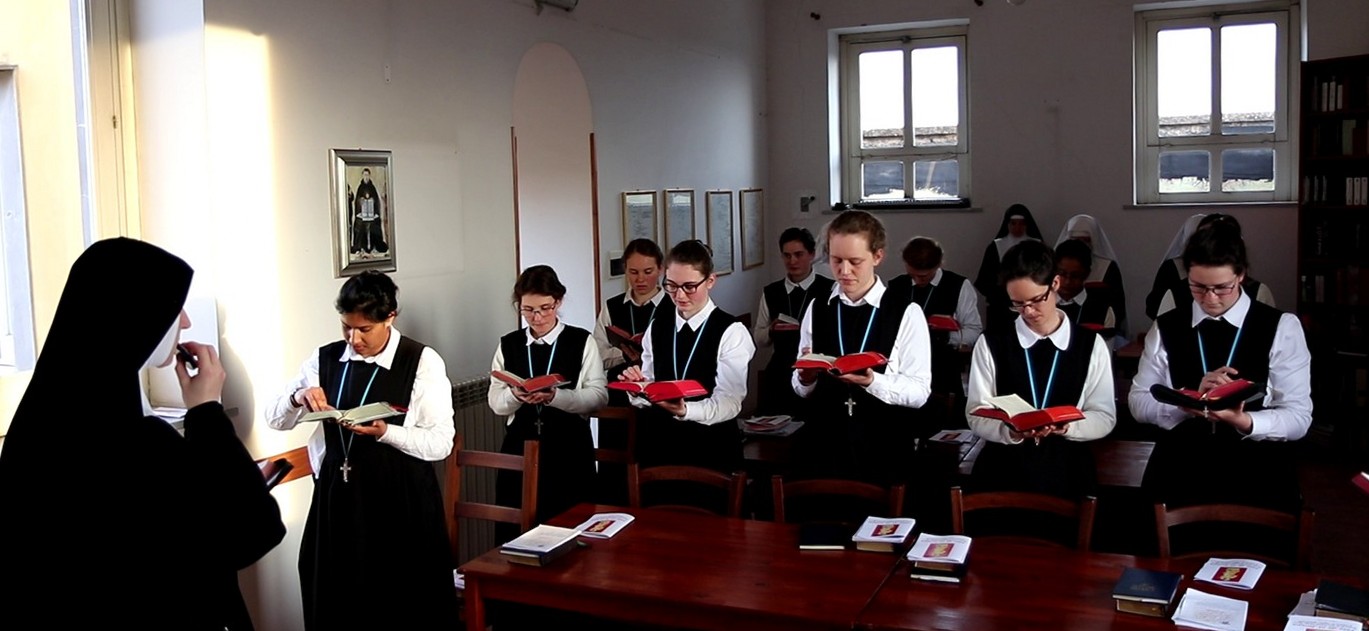 As part of their formation, the sisters have two years of intensive classes in Gregorian chant. To ensure that the chants of the Mass and the Divine Office are sung as properly and beautifully as possible, the community rehearses together each day the antiphons and hymns of the Office of the day and the Propers of the Masses that they will be singing.
As part of their formation, the sisters have two years of intensive classes in Gregorian chant. To ensure that the chants of the Mass and the Divine Office are sung as properly and beautifully as possible, the community rehearses together each day the antiphons and hymns of the Office of the day and the Propers of the Masses that they will be singing.
The sisters, like the canons and seminarians of their Institute, sing in the spirit of the tradition of the Abbey of Solesmes and of its choral master, Dom Joseph Gajard. The chief characteristics of this method are its gentle and flowing manner and the importance placed on the Latin text.
Dom Gajard emphasized above all the supernatural aspect of Gregorian chant, as when he wrote to the Schola Saint-Grégoire: “You have not only come together for religious music, but also to praise God, in the very language and with the very accents of His Church: that is to say that, lifting yourselves far above a merely artistic or musical plane, you have reached a supernatural sphere. For it is indeed your intention, I know it well, in consecrating yourselves exclusively to the chanted prayer of the Church that is the Gregorian melody. Be assured that you will not regret it. Beneath its apparent, and perhaps real, austerity, the Gregorian melody hides a power of expression and of prayer that is known only to its faithful. In it you will find an incredible help for your interior life, for it reflects and fosters all that it means to be Christian, not the atrophied Christianity by which we suffer so much today, but the true and authentic Christianity, the union with God in faith, in peace, in confidence, in hope, above all in love, in a complete filial abandon to God.”
“The Church evangelizes and is herself evangelized through the beauty of the liturgy ”
His Holiness Pope Francis, Apostolic Exhortation Evangelii Gaudium, 24 November 2013.
Compline and Great Silence
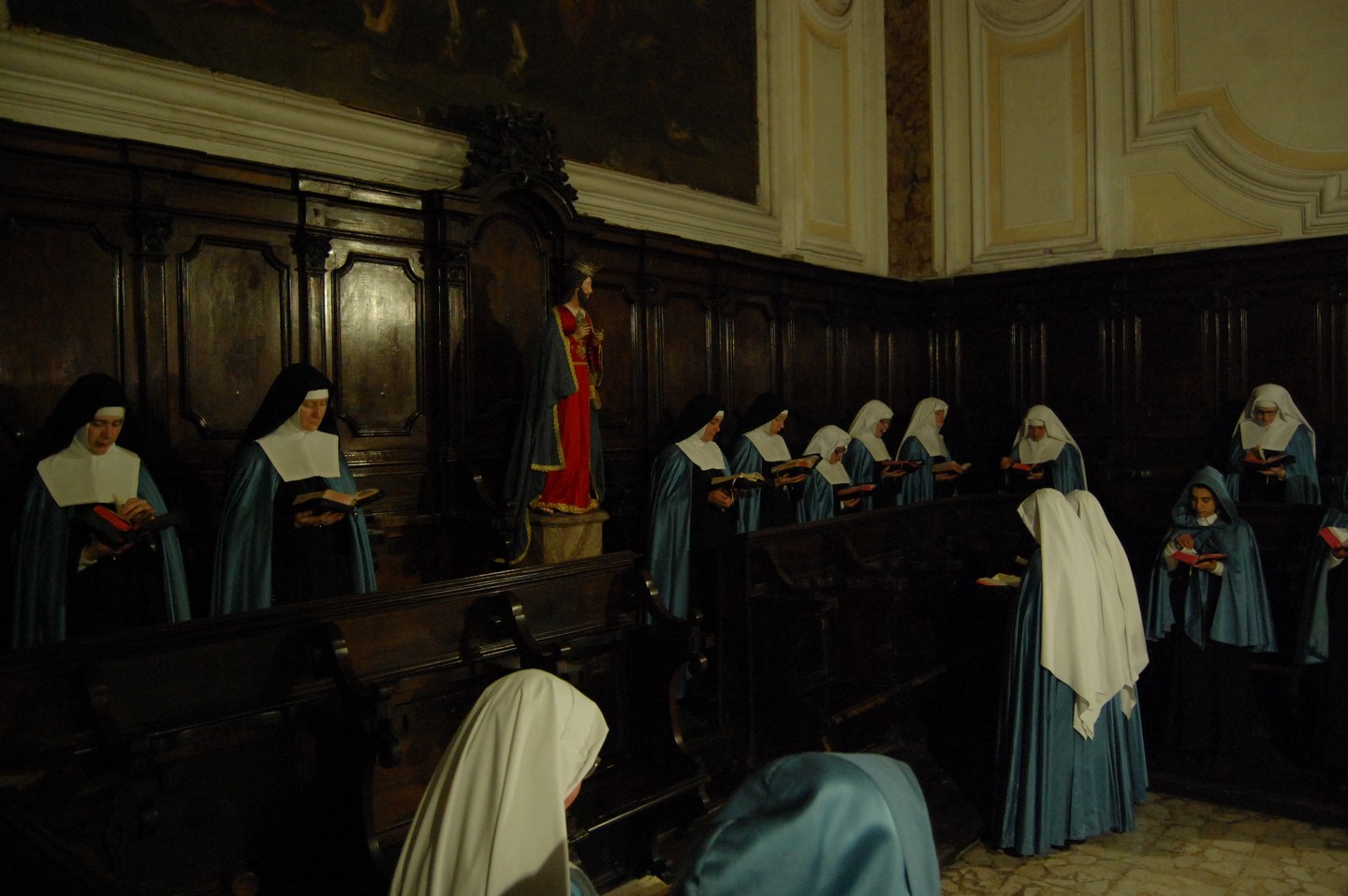
At 9 pm, the Office of Compline is sung in thanksgiving for the past day as well as in a spirit of filial abandon to Divine Providence.
“Our silence is not the void of death; on the contrary, it helps us to approach the fullness of life. We stay quiet because the words by which our souls desire to live cannot be expressed in the words of this world
“We must learn to pray in all places and at all times. Where prayer is present, the soul and God dwell therein. When you pray, follow the counsel of Jesus: enter into the hidden inner room of your soul, close the door and speak to your Father whose loving gaze searches for your own… In this guarded sanctuary, the new heaven and kingdom of God, solitude and silence must reign.” Dom Guillerand o. cart.





